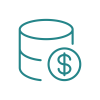The concept of a data product relates to the byproducts of information gathered during a company’s normal business operations. There is value in this data in selling or licensing it, or creating new products and services.
Examples of Data Monetization
- Data as a Product: Companies can package and sell their data to other businesses or data brokers. This data can be valuable for market research, competitive analysis, or enhancing other businesses’ data analytics capabilities. For example, a retail company might sell data about shopping trends and consumer behavior to market research firms.
- Data Partnerships: Businesses can form partnerships where they share their data exhaust in exchange for compensation or reciprocal data sharing. For instance, a social media platform might partner with a marketing firm, providing them with user engagement data which the marketing firm can use to refine their strategies.
- Data Syndication: Companies can syndicate their data to various outlets. Data syndication involves a company providing the same data to multiple customers, often through an API or data feed. For example, a financial services company might syndicate real-time transaction data to financial analysts or investment firms.
- Data for Targeted Advertising: Companies can sell user data to advertisers who want to target their ads more effectively. For example, a streaming service might sell viewing habit data to advertisers so they can target ads to viewers likely interested in their products.
- Data for Benchmarking Services: Companies can use their data to create benchmarking reports or services for other businesses in their industry. For instance, an e-commerce company could create reports on average purchase sizes or most popular product categories, valuable for other businesses in the sector.
- Data for Training AI Models: Data-rich companies can sell their data to tech companies or research institutions for training AI models. For example, a company with extensive image or video data might sell this data to help train computer vision algorithms.
- Risk Assessment and Management: Companies, particularly those in finance or insurance, can sell their data to firms looking to assess risk. For example, credit card transaction data can be valuable for firms trying to identify fraud patterns.
- Data in Healthcare: In the healthcare sector, anonymized patient data can be sold to research institutions, pharmaceutical companies, or health tech companies for research and development purposes.
- Real Estate and Urban Planning: Companies in the real estate sector can sell data about property values, rental trends, or urban development to developers, urban planners, or government agencies.
Data Monetization Partnerships
Beyond internal company data exhaust, First Analtyics partners with companies to add value, through analytics, to their data-based product offerings.
